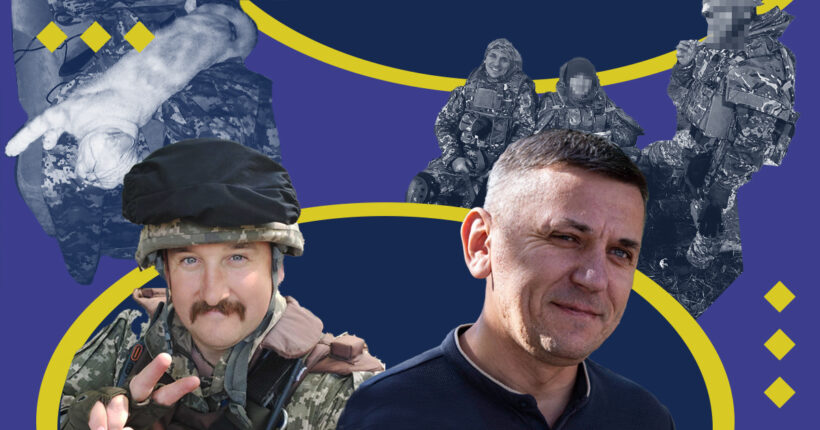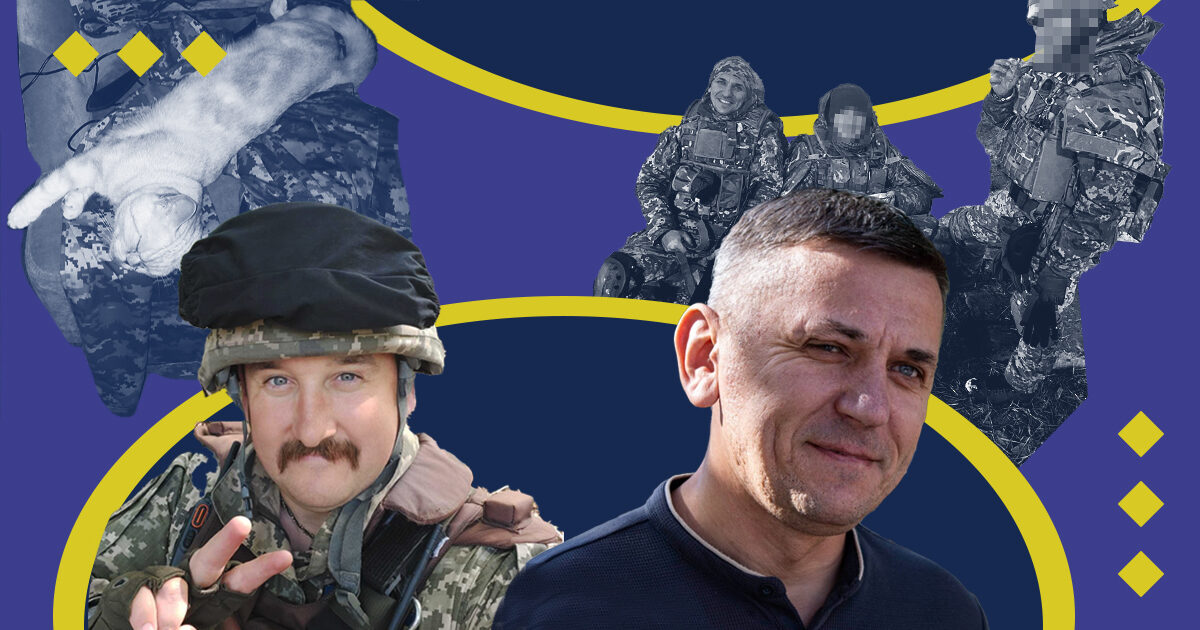
Both veterans work for BGV Group Management, a company that kept their jobs open during their military service and is now helping them transition back to civilian life. Their stories of service and demobilization follow.
Volodymyr Kononenko: "Family and work are my rehabilitation"
Volodymyr, 35, is a permit specialist at the KOLO store chain's legal department and a senior sergeant in the 45th Separate Rifle Battalion, 31st Separate Mechanized Brigade.
He stepped into the military enlistment office on the very day the full-scale war began. With a laugh, Volodymyr says that he and his friends were warmly welcomed. That same day, they formed the core of the defense team for their local military enlistment office in the neighborhood of Solomianka in Kyiv.

Volodymyr Kononenko
Volodymyr and his friends had actually started preparing for such a day three years earlier. They had created a small "club of interests" where they met every Saturday, training from morning to evening — running, shooting, learning medical skills, and even digging trenches.
"I was born and raised in Solomianka. I love my neighborhood, and that's what I fought for," says Volodymyr. "Together with the local guys, we were always preparing for war as civilians. We didn't know there would be a full-scale invasion, but we wanted to be ready, just in case, to protect ourselves and our families. On the front, you need to know everything — nothing is useless."
All their training came in handy. First, when Volodymyr helped liberate the Kyiv region from the Russian occupation, and later on every front where he served. "When we were clearing and liberating Irpin, we were sent there as part of consolidated units. The events of 2022 are now a blur, but what I will never forget is the price we paid for defending Kyiv," the veteran recalls.

Volodymyr (left) with comrades. Photo from his personal archive
Volodymyr and his friends from the neighborhood were assigned to different brigades, and he himself became an infantryman. The service was hard, and though soldiers tried to stay positive, it didn't always work out. Volodymyr says he never worried something bad would happen to him despite the challenges: "You just can't be afraid. You can't fear death — you have to believe everything will be fine. I never once thought something would happen to me or that I'd die. No, I always believed things would turn out okay. I guess that's just the way my mind works — believing in myself and my luck."

Volodymyr's friends, family, and colleagues, who supported him from the moment he decided to join the armed forces, helped him stay optimistic.
"The key is knowing that someone is waiting for you. I knew I had a place to come back to. My colleagues supported me from day one and never forgot about me — that helped a lot," the veteran says. "Some of the guys I served with weren't sure they had anywhere to return to, and their attitude toward life was completely different."
Beyond family support, the brotherhood within his unit was particularly valuable to Volodymyr. He speaks confidently about it:
"All my comrades, those who were there with me, who went through it all with me — they're my brothers. I'll never stop talking to them. Brotherhood is unity, looking out for each other. I was always sure someone would have my back, and no one would ever stab me in it."

Due to health issues, Volodymyr was recently demobilized while his unit continued to fight. "Unfortunately, I'm no longer there. I feel like I haven't finished what I started," he says. "I still miss my comrades. I'd like to go back, but my health won't allow it. Here, in the rear, I'm still useful, but over there, I'd just be a burden."
Adjusting to civilian life was challenging at first. Volodymyr remembers how tough it was to visit shopping malls — being in crowded places made him want to escape and be alone in a quiet space. "I tried to spend as much time alone as possible. But I think a person can get used to anything, and it's just a matter of time," he says. He advises other veterans to take things slow and give themselves time — "some memories fade, some stay, but time heals."

After leaving the service, Volodymyr took a short vacation to spend time with his family before returning to work. His job had been held for him the entire time, so he knew he would go back to his usual duties. "Work helps me. Family and work are my rehabilitation. They help me think less about what happened over there. I enjoy the interactions with people and the sense that what I do matters, that I'm not wasting my time," he shares.
The veteran has advice for other companies and employers: "Don't focus too much on what a person has been through. For me, it's important that people aren't afraid of those like me. In some companies, people are wary because of concussions or mental health issues veterans may face."
Volodymyr advises not to ask veterans about what happened at the front unless they want to share. It's hard for soldiers to talk about it, especially when it means remembering the loss of comrades.
Roman Smetaniuk: "After I returned, I became hungry for life"
Roman, 44, a project manager at BGV Group Management, served in air defense forces as a squad commander operating man-portable air defense systems in the Yeheria unit.
"Once, I was forgotten at a combat post for 42 days. My team was taken to Zaporizhzhia, but I was left behind — their commander," Roman laughs. "What did I do? I kept doing my job: writing reports, documenting, and submitting data. Around day 25, an inspection team came, and it was just me and a dog named Polkan. The officers arrived and said, 'Sergeant, account for your team.' I could tell they had no idea what was going on. So I said, 'The team consists of me and Polkan.' They looked at me, asked about supplies, and I said, 'They gave me a gun, and I work with the locals.'"

Roman Smetaniuk. Photo from his personal archive
Roman, who had never been involved in the military before, joined the armed forces in 2022. Originally from the Kharkiv region, he defended his home village with other locals in February and March.
"My family was in the basement. Everything was burning and shaking. Artillery was pounding. A full-scale battle was raging around the village," he recalls.
The locals formed a self-defense unit, set up checkpoints, and patrolled the village at night to protect it from looters. Eventually, the commander of the 93rd Brigade, stationed in the village at the time, asked the men to help the military coordinate artillery fire since they knew the area better than anyone.
"When the guys from the 93rd asked us to check out a certain sector, we'd go out and locate where the Russian equipment was, how it was moving, and figure out how to approach it," Roman explains.
The self-defense unit also helped clear the area of markings and worked against sabotage groups. Roman later found out that these markings were used to guide the route of enemy tank columns.
"For example, a column might be moving from Kharkiv to Derhachi, and the enemy might not have communication. So, one of their saboteurs or our traitors would mark the route with symbols that light up when you look at them through gear," the veteran explains.
"Some people are forged in fire, while others emerge from the shadows," Roman came across this phrase in March 2022, and it became his motto for the years he spent at the front.
"I find it funny when people say, 'I'm not made for war' or 'We're not going to defend the government.' You're defending your people, your existence. Those who've witnessed this fear, this bloodshed, who've lost their brothers and sisters and seen civilians die, they understand this. I went to defend the country, the Ukrainian people — whether they're from Odesa or Zhytomyr, I will protect them all," Roman says.

Roman Smetaniuk. Photo from his personal archive
Roman's journey took him from being a rifleman and grenadier to a squad commander. Together with his comrades, they learned everything as they went. "During combat, we learned how to shoot down helicopters and missiles, how to trap them. If you effectively strike a target once, the enemy will be afraid for two or three weeks. They only understand strength," the veteran recalls.
In addition to self-teaching, the soldiers also trained small "assistants" they encountered along the way. They often came across animals abandoned by their owners, who fled, leaving them chained. The soldiers would take these animals with them and feed them.
"Wherever we went, animals would come to us, like some kind of angelic protection," Roman remembers. "Cats saved our lives from mortar fire. One would be lounging in the sun, and then suddenly, it would come to you. Once the cat hid, you'd soon hear an incoming shell. On the other hand, dogs were real guardians, never attacking their own. Once, the guys were escorting a Russian, and our dog went crazy, barking. Even though the Russian was in uniform, the dog could sense the difference. We were amazed at how it could tell who was human and who wasn't."
The loss of comrades was a profound source of disillusionment for him. "The best guys, golden guys, were lost. At one post, several souls died right in front of me. It was terrifying," Roman says. "That kind of disappointment comes with a burning rage, a rage you can't explain. I saw basements filled with blood, our guys tortured by the Russians. Most people don't understand the evil we're facing. It just has to be crushed, defeated. And we will defeat it, no doubt, even if it takes time."
The team around him constantly changed, but one tradition remained: honoring those no longer with them. "We always remember the guys wherever we meet. I've returned to civilian life, but the war has stayed with me. When we meet, we hug, and the tears come right away. We remember who's no longer with us, who has moved on. We're like a family," the veteran says.

Roman with brothers-in-arms. Photo from the archive
Roman was demobilized after suffering two severe concussions that caused him to frequently lose consciousness. "I'd be walking and suddenly fall down. I couldn't continue because I might have let the guys down," the veteran explains. After returning home, Roman faced a long road to recovery.
Throughout this time, his colleagues at BGV supported him and his unit, purchasing necessary equipment like drones and thermal imagers, raising funds to repair vehicles, and waiting for his return. "I didn't just return to work. I returned to a family," says Roman. "I remember the first time I came back to the office, and there was a big banner over my desk that read, 'Welcome back!' I still have it. Everyone hugged me, congratulated me. That kind of support is crucial for reintegration. You come back to a family that's been waiting for you, praying for you, believing you'd come back alive."
Roman is now a project manager, undergoing rehabilitation and slowly recovering. He says, "After I returned, I became hungry for life. God gave you life, so live each minute, each year, 100 years of life to the fullest. You only get one. That's how I live, and that's what I tell my comrades."






